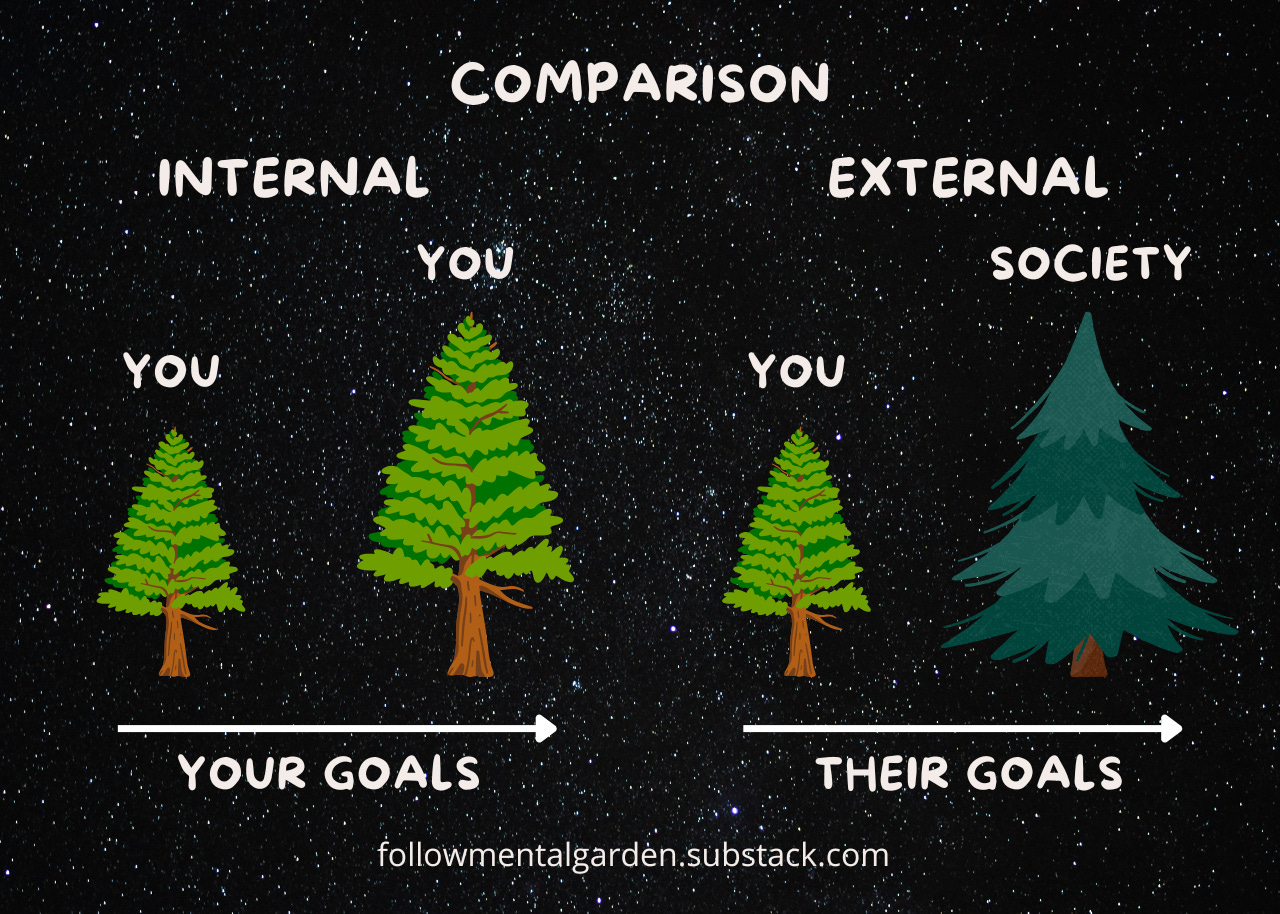Internal comparison: the key to living with intention
Social media, ego and validation: the danger of outward comparison
🏷️ Categories: Continuous improvemen, Life lessons, Social relationships.
There are two ways to compare yourself: from the inside or from the outside.
The first is silent.
The second, loud.
Human evolution left us with the need for social validation.
Humans seek to improve their status, which is reflected in ego, reputation, and place in the hierarchy. Today's world amplifies that comparison: social media and all kinds of metrics drag us into external comparison. Being better than others.
And I wonder… What happened to internal comparison?
Wanting to surpass others and be validated can motivate you to achieve great things, but problems arise when you sacrifice your values just to outdo others. When you prioritize the external over the internal, you lose your essence and hand over control of your life to others.
In reality, the greatest satisfaction won’t come from outperforming your neighbor, but from outperforming yourself.
That’s the difference between internal and external comparison.
You’ll see why using the internal one is crucial…
Who defines success?
Would you rather be the best person in the world, but everyone thinks you're the worst? Or be the worst person, but everyone thinks you're the best?
This idea from investor Warren Buffett gives us the key (Schroeder, 2008).
If you live by external comparison: your ambitions will be society’s.
If you live by internal comparison: you decide what success means, not others.
Warren Buffett advises us to orient our lives toward internal comparison. That way, success won’t depend on what others think. Nor will it change with trends. Nor can it be bought with likes or millions of followers. When you live according to internal comparison, your only mission is to be better than yesterday, in your own goals.
And that changes everything.
Investor Guy Spier, after having lunch with Warren Buffett, admitted that Buffett's most remarkable trait wasn't his intelligence or wealth — it was his internal consistency (Spier, 2014).
"One of the defining characteristics of Buffett is that he lives by his own scorecard. It’s not just that he does the right thing, but that he does what is right for him. As I saw during our lunch, there is nothing fake or forced about him. He sees no reason to compromise his standards or violate his beliefs." — Guy Spier
He doesn’t need applause; he has nothing to prove. His values are clear.
And that, in a world lacking integrity and starving for external validation, is revolutionary.
This is why internal comparison is so valuable — because if you base your life on the external, you prioritize image over essence, and your life begins to distort.
You start acting against your values.
You start making decisions just to fit in.
You start measuring your life by metrics you never even chose.
Be careful with your point of reference when comparing yourself.
Be clear about your principles and aspirations. Work to improve in that direction.
The Vital Fraction
Imagine your life as a fraction:
Numerator: achievements, success, wealth, status, validation.
Denominator: anxiety, regret, guilt, loneliness, disconnection.
You can have the biggest numerator in the world… but if the denominator also grows, your satisfaction will be minimal. This explains why so many "successful" people are unhappy. Like the professional who works from dawn to dusk and feels empty when they get home. Or the influencer who can’t bear the thought of no longer being popular.
It can happen to anyone — you, me — if we ignore the denominator.
And to protect the denominator, Nassim Taleb once said:
“The optimal solution to remain independent and have integrity while still being a social animal is: first your own self-respect, then that of others, as long as your external image doesn’t conflict with your self-respect.”
Most people get this backwards and prioritize social admiration and “a good reputation” over self-esteem. Everyone tries to fit in at any cost, even if that means losing themselves along the way and giving up on their principles and dreams.
And when you get that lost, you no longer know who you are or what you want…
True success is not fame, nor fortune, nor recognition. It is knowing each night as you close your eyes that you are at peace with yourself. That you didn’t betray your values. That your path is yours — not a copy of someone else’s.
The only metric worth being proud of is being better today than you were yesterday.
✍️ Your turn: Are you working to become someone you would respect — even if no one else did? Find what a full life means to you and pursue it according to your principles.
💭 Quote of the day: “The big question about how people behave is whether they've got an internal or an external scorecard. It helps if you can be satisfied with the internal one.” — Warren Buffett, The Snowball
See you next time, hugs! 👋
References 📚
Schroeder, A. (2008). The Snowball: Warren Buffett and the Business of Life.
Spier, G. (2014). The Education of a Value Investor: My Transformative Quest for Wealth, Wisdom, and Enlightenment.







thank you, alvaro. i hope i can live an internal, silent kind of self-satisfied life. this idea reminds me of an old saying, "still waters run deep." keep going. ur fan, j.